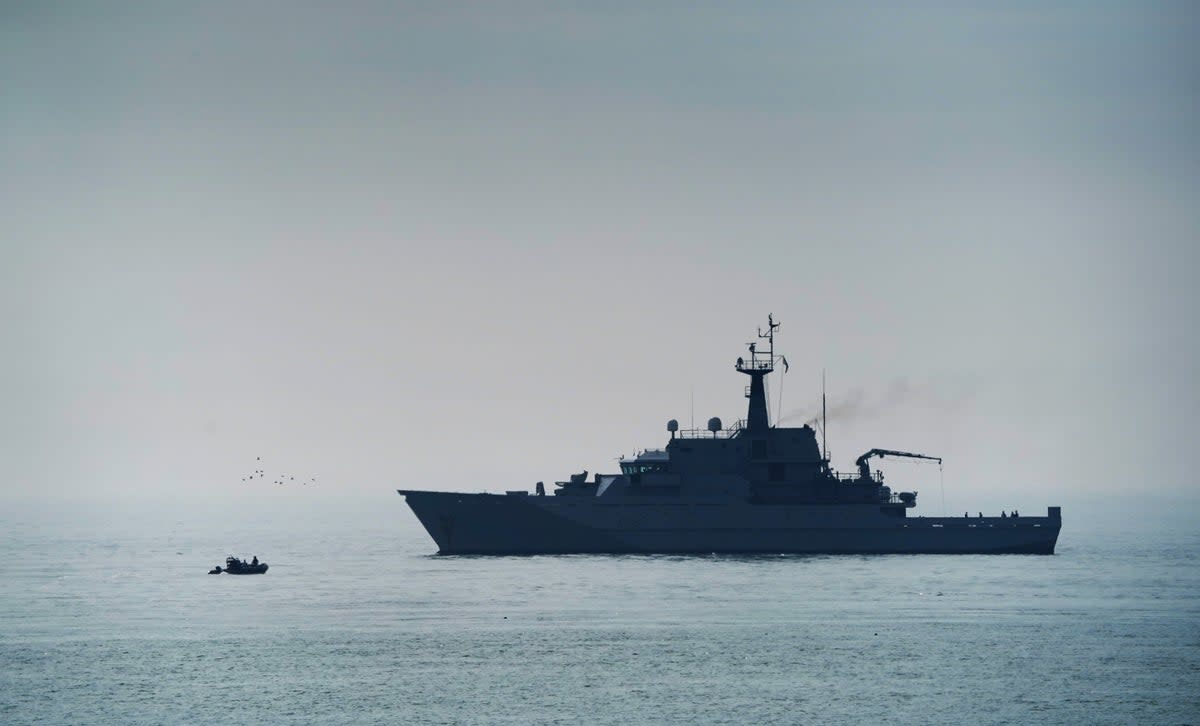Revealed: £30m navy patrols in Channel failed to deter small boats

The government spent at least £30m on Royal Navy patrols in the English Channel that failed to deter small boat crossings, The Independent can reveal.
Figures released under freedom of information laws show that Operation Isotrope, which ran between April last year and the end of January, has a “current recorded cost” of over £29.7m.
Ministers including former home secretary Priti Patel had claimed that naval patrols would act as a “deterrent” but crossings rocketed to record highs during the period.
Yvette Cooper, Labour’s shadow home secretary, told The Independent: “The Conservatives have spent four years chasing headlines rather than tackling the problem.
”They spent £30m of taxpayers' money and made grand promises about what the navy would do, even though they were warned repeatedly that it wouldn’t work and the number of dangerous boat crossings has shot up.”
The Ministry of Defence said the figure does not represent the full cost “as there are a number of financial lines that are still being captured”.
The spending can be revealed as Suella Braverman is making plans to deport migrants to Rwanda by the summer, while the government in Kigali said it was “ready to absorb the thousands that will come from the UK”.
A Home Office source said: “We are certainly working towards getting the flights off before the summer”, adding that the home secretary acknowledged the schedule was dependent on pending legal battles.
In her first trip to the central African nation as home secretary, Ms Braverman on Saturday visited facilities being built to house people removed from Britain.
The deal is integral to the new Illegal Migration Bill, which aims to let the UK detain and deport small boat migrants without considering their claims.
Ms Braverman has admitted the bill may break international law and there are practical questions about whether there are sufficient detention places and returns deals in place to implement it.
The prime minister has separately agreed to give France almost £500m over three years for increased efforts to stop dinghies departing its northern coast.
Clare Moseley, the founder of Care4Calais, said: “Money continues to be spent on security and deterrence but the number of small boat crossings keeps rising.
“It’s time the government stopped wasting money on anti-refugee policies and adopted the only solution that will end small boat crossings, put people smugglers out of business and save lives – giving visas for safe travel to people in Calais who have viable asylum claims.”
Tim Naor Hilton, chief executive of charity Refugee Action, called the government’s approach “nasty, ineffective and expensive”.
“Their new anti-refugee bill will only ramp up the cost and the cruelty and solve none of the problems in the asylum system,” he added.
In February 2022, Ms Patel told a parliamentary committee the aim of naval patrols was “a clear deterrent impact and message” and refuted suggestions that increasingly organised rescue operations could encourage migrants to use small boats.
The Independent understands the Royal Navy regards its involvement as a success, because of a fall in the number of dinghies that reached land without being intercepted and the number of lives saved from vessels in distress.
The military did not adopt the Home Office’s aim of “deterrence”, which is also the strategy underpinning the Rwanda deal, new Illegal Migration Bill and other policies that have not so far achieved a decrease in Channel crossings.
A representative of the Immigration Services’ Union, which represents Border Force staff and those in the new Small Boats Operational Command, condemned the government’s “reactionary” response to crossings.
Lucy Moreton told The Independent: “The approach of the UK government to small boat crossings has always been reactionary and predicated on the false presumption that this traffic, now established, could be stopped.

“Vast sums have been spent in short term crisis response, and in attempting to offshore the problem, rather than investing properly in the UK systems to be able to make lawful decisions within a reasonable timeframe.”
The PCS union, which represents Border Force and Coastguard staff, said the government should focus on Home Office processes to speed up asylum processing “free from political pressure and interference”.
General secretary Mark Serwotka added: “Instead of investing £30m in deterrents that haven't worked, the government should be investing in a Safe Passage Visa Scheme, to allow refugees to enter the UK safely and begin their asylum claim.”
The number of migrants intercepted on small boats rose to new records after Royal Navy patrols began last April, rocketing to 47,000 in the remainder of 2022, compared to 34,000 in the same period the previous year.
But the operation also saw the number of known “uncontrolled landings” by small boats who reached the English coast fall by 82 per cent.
Primacy for Channel patrols was handed back to Border Force on 31 January, after Rishi Sunak announced the creation of a new Small Boats Operational Command.
Ministry of Defence staff and assets are still supporting the unit, alongside the National Crime Agency and other bodies, but the new structure was hoped to better coordinate and resource intelligence, interception, processing and enforcement relating to small boat migrants.
A government spokesperson said: “Under military primacy, improvements were made to intercept more unsafe boats before they reach the UK.
“We will continue to use every tool at our disposal to stop the boats and break the evil people smugglers’ business model.”

 Yahoo Lifestyle
Yahoo Lifestyle 
